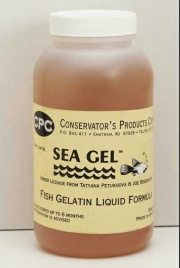Difference between revisions of "Fish glue"
(username removed) |
|||
| (2 intermediate revisions by 2 users not shown) | |||
| Line 2: | Line 2: | ||
== Description == | == Description == | ||
| − | A proteinaceous, water soluble [ | + | A proteinaceous, water soluble [[adhesive]] made from fish parts containing [[collagen]], [[keratin]], or [[elastin]]. The agglutinating agents are remove by extraction with hot water, then cooled and dried to produce [[gelatin]] or [[glue]]. Varied production techniques can produce poor-quality fish glues. The highest quality is made from the swim bladders of sturgeons. It is clear, bluish white and very flexible. [[Isinglass]] is a fine glue made from a specific type of sturgeon. it is generally sold in narrow soft translucent strips. In general, fish glues are lighter in color than [[hide glue]] and form a weaker adhesive bond. It dries to a hard, sandable surface and adheres well to [[glass]], [[ceramic|ceramics]], [[metal]], [[wood]], [[cork]], [[paper]], and [[leather]] (Norland 1977). Fish glue is sold in liquid form and is used in painting, gilding, bookbinding, casemaking, gummed tapes, [[blueprint paper]], and letterpress printing plates. |
== Synonyms and Related Terms == | == Synonyms and Related Terms == | ||
| − | + | colle de poisson (Fr.); cola de pescado (Esp.); colla di pesce (It) | |
| − | Examples include: isinglass; sturgeon glue; Sea | + | Examples include: isinglass; sturgeon glue; Sea Gel; StewMac |
| + | ==Physical and Chemical Properties== | ||
| − | = | + | * Soluble in water (pH = 6.5-7.2). |
| + | * Insoluble in organic solvents. | ||
| − | + | ==Resources and Citations== | |
| − | + | * R.Norland, "Fish Glue" in ''Handbook of Adhesives'', I.Skeist (ed.), Van Nostrand Reinhold, New York, 1977, p.152-157. | |
| − | |||
| − | |||
| − | |||
| − | |||
* R. J. Gettens, G.L. Stout, ''Painting Materials, A Short Encyclopaedia'', Dover Publications, New York, 1966 | * R. J. Gettens, G.L. Stout, ''Painting Materials, A Short Encyclopaedia'', Dover Publications, New York, 1966 | ||
| Line 28: | Line 26: | ||
* Matt Roberts, Don Etherington, ''Bookbinding and the Conservation of Books: a Dictionary of Descriptive Terminology'', U.S. Government Printing Office, Washington DC, 1982 | * Matt Roberts, Don Etherington, ''Bookbinding and the Conservation of Books: a Dictionary of Descriptive Terminology'', U.S. Government Printing Office, Washington DC, 1982 | ||
| − | * Art and Architecture Thesaurus Online, | + | * Art and Architecture Thesaurus Online, https://www.getty.edu/research/tools/vocabulary/aat/, J. Paul Getty Trust, Los Angeles, 2000 |
[[Category:Materials database]] | [[Category:Materials database]] | ||
Latest revision as of 10:05, 16 June 2022
Description
A proteinaceous, water soluble Adhesive made from fish parts containing Collagen, Keratin, or Elastin. The agglutinating agents are remove by extraction with hot water, then cooled and dried to produce Gelatin or Glue. Varied production techniques can produce poor-quality fish glues. The highest quality is made from the swim bladders of sturgeons. It is clear, bluish white and very flexible. Isinglass is a fine glue made from a specific type of sturgeon. it is generally sold in narrow soft translucent strips. In general, fish glues are lighter in color than Hide glue and form a weaker adhesive bond. It dries to a hard, sandable surface and adheres well to Glass, ceramics, Metal, Wood, Cork, Paper, and Leather (Norland 1977). Fish glue is sold in liquid form and is used in painting, gilding, bookbinding, casemaking, gummed tapes, Blueprint paper, and letterpress printing plates.
Synonyms and Related Terms
colle de poisson (Fr.); cola de pescado (Esp.); colla di pesce (It)
Examples include: isinglass; sturgeon glue; Sea Gel; StewMac
Physical and Chemical Properties
- Soluble in water (pH = 6.5-7.2).
- Insoluble in organic solvents.
Resources and Citations
- R.Norland, "Fish Glue" in Handbook of Adhesives, I.Skeist (ed.), Van Nostrand Reinhold, New York, 1977, p.152-157.
- R. J. Gettens, G.L. Stout, Painting Materials, A Short Encyclopaedia, Dover Publications, New York, 1966
- Reed Kay, The Painter's Guide To Studio Methods and Materials, Prentice-Hall, Inc., Englewood Cliffs, NJ, 1983
- Ralph Mayer, A Dictionary of Art Terms and Techniques, Harper and Row Publishers, New York, 1969 (also 1945 printing)
- Matt Roberts, Don Etherington, Bookbinding and the Conservation of Books: a Dictionary of Descriptive Terminology, U.S. Government Printing Office, Washington DC, 1982
- Art and Architecture Thesaurus Online, https://www.getty.edu/research/tools/vocabulary/aat/, J. Paul Getty Trust, Los Angeles, 2000
